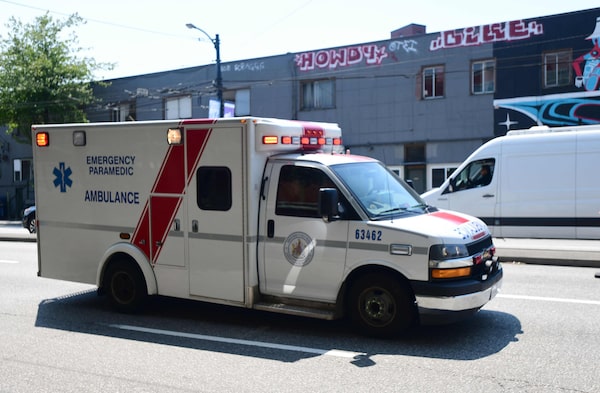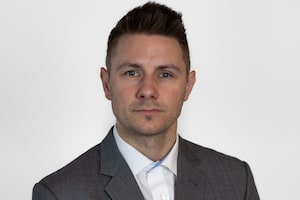
Paramedics who worked during the heat wave described a service overwhelmed with hundreds of high-priority calls.DON MACKINNON/AFP/Getty Images
British Columbia has appointed Vancouver’s former police chief to supervise an overhaul of how ambulances, paramedics and 911 dispatchers respond to medical emergencies on Canada’s West Coast.
The move, announced Wednesday afternoon, was prompted by an unprecedented heatwave last month that is being tied to nearly four times as many sudden deaths that week than in years past. Patients in and around Vancouver reported waiting hours before front-line staff showed up to help.
Jim Chu retired as Vancouver’s police chief in 2015 after more than three decades in policing and now works for real estate developer Aquilini Investment Group. He accepted the offer Monday to chair B.C Emergency Health Services’ new board of directors, which will report directly to the provincial agency that oversees all specialized health services, as well as Health Minister Adrian Dix.
Mr. Chu said during a news conference on Wednesday that his first order of business will be to listen to the concerns of a paramedic corps exasperated with deficiencies in the ambulance system.
B.C. heat wave highlights growing power of science to discern human influence on extreme weather
He added that his mission in the role would be ”listening and learning from people that have been in the field for many more decades than I have.”
The current EHS executive team is staying on, despite widespread criticism from paramedics and families of those who died that they were too slow to ratchet up their official response to the heatwave. However, the agency has created the new executive position of chief ambulance officer that will report directly to Mr. Chu and be tasked with improving the day-to-day operations of the BC Ambulance Service as well as the working conditions for more than 4,500 paramedics, call-takers and dispatchers across the province.
The Globe and Mail spoke with four paramedics who worked during the heatwave. All described a service overwhelmed with hundreds of high-priority calls. Oftentimes when they arrived at the scene, someone had already died.
The paramedics said these shifts took an emotional toll and were also physically exhausting: Paramedics were wearing their uniforms as well as a plastic gown on top and other personal protective equipment while entering residences as hot as 45 Celsius to resuscitate people. They said they were soaked in sweat and some of their colleagues got sick from the heat.
Typically, multiple ambulances respond to high-priority calls. But because resources were spread so thin, only one vehicle was responding to each call. Hospitals were also overwhelmed, and often couldn’t accommodate the patients paramedics were transporting.
The paramedics asked not to be named because they feared repercussions from their employer.
Troy Clifford, president of the Ambulance Paramedics of BC union, welcomed Wednesday’s announcement, saying he felt cautiously optimistic since the government appeared to have listened to criticisms from him and his colleagues, noting he will be meeting with the new interim chief ambulance officer on Thursday.
As B.C.’s unseasonably hot summer continues, one measure announced by the province that could quickly improve service and working conditions for paramedics is the hiring of more mental-health professionals, he said. Mr. Clifford, who worked as a paramedic for more than 30 years, said up to a quarter of his members are now either seeking mental-health treatment after a critical incident on the job, are off work getting treatment for physical injuries or are in the process of filing a worker’s compensation claim because of the pressures of their workplace.
Ensuring more mental-health resources are available for paramedics would help keep them working without burnout or allow them the time to fully recover from any injuries, Mr. Clifford said in an interview after Wednesday’s EHS announcement.
Some paramedics said that because of issues with staffing, recruitment, retention, compensation and working conditions, many paramedic positions go unfilled and ambulances are understaffed – even though they’re operating at capacity on even a regular day. So when there’s a surge incident, such as the heat wave, there aren’t enough ambulance workers to respond to the increase in demand.
Mr. Dix said his government has increased funding for the service during its four years in power, but acknowledged more paramedics need to be hired. B.C. is also directing the relevant licensing board to examine whether firefighters should be allowed to do more to help respond to medical emergencies, with recommendations due by Sept. 6.
To solve the understaffing problem, Mr. Dix announced the province is hiring 85 new full-time paramedics, 30 dispatchers and buying 30 new ambulances.
“Clearly our ambulance paramedics, they are working flat-out,” he said of emergency workers’ response to call volumes that have stayed higher than normal since B.C. began to reopen in June, followed by the heat wave descending on the province over the past few weeks.
We have a weekly Western Canada newsletter written by our B.C. and Alberta bureau chiefs, providing a comprehensive package of the news you need to know about the region and its place in the issues facing Canada. Sign up today.
 Mike Hager
Mike Hager